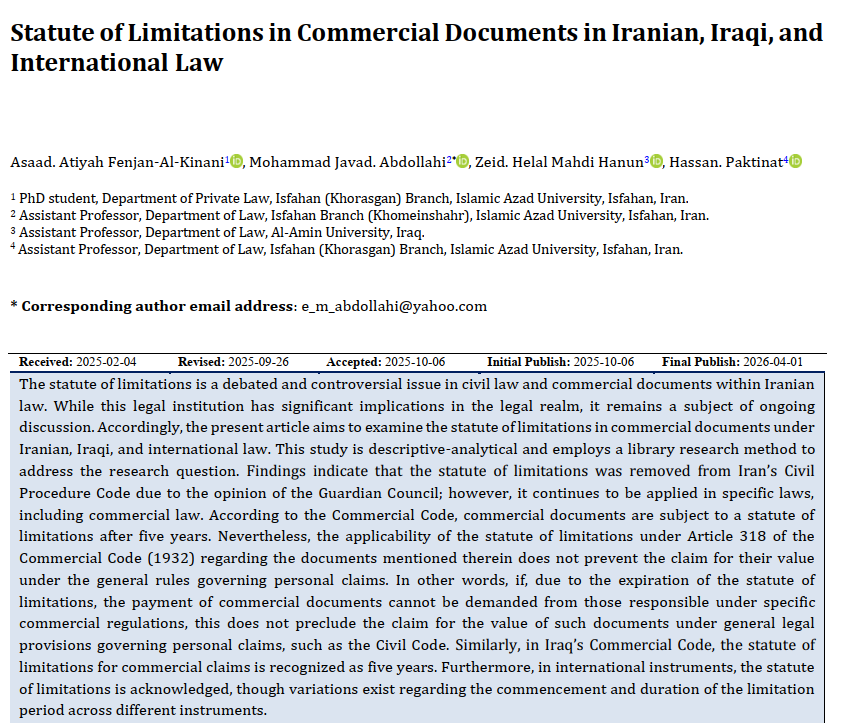Statute of Limitations in Commercial Documents in Iranian, Iraqi, and International Law
Keywords:
Statute of Limitations, Iranian Law, Iraqi Law, International Instruments, Limitation Period, Commercial DocumentsAbstract
The statute of limitations is a debated and controversial issue in civil law and commercial documents within Iranian law. While this legal institution has significant implications in the legal realm, it remains a subject of ongoing discussion. Accordingly, the present article aims to examine the statute of limitations in commercial documents under Iranian, Iraqi, and international law. This study is descriptive-analytical and employs a library research method to address the research question. Findings indicate that the statute of limitations was removed from Iran’s Civil Procedure Code due to the opinion of the Guardian Council; however, it continues to be applied in specific laws, including commercial law. According to the Commercial Code, commercial documents are subject to a statute of limitations after five years. Nevertheless, the applicability of the statute of limitations under Article 318 of the Commercial Code (1932) regarding the documents mentioned therein does not prevent the claim for their value under the general rules governing personal claims. In other words, if, due to the expiration of the statute of limitations, the payment of commercial documents cannot be demanded from those responsible under specific commercial regulations, this does not preclude the claim for the value of such documents under general legal provisions governing personal claims, such as the Civil Code. Similarly, in Iraq’s Commercial Code, the statute of limitations for commercial claims is recognized as five years. Furthermore, in international instruments, the statute of limitations is acknowledged, though variations exist regarding the commencement and duration of the limitation period across different instruments.
Downloads
References
Akhlaghi, B. Commercial Law Notes (Vol. 3). University of Tehran, Faculty of Law and Political Science Press.
Akhlaghi, B., & Emam, F. (2009). Principles of International Commercial Contracts. Shahr-e Danesh Publications.
Danny, B. (2006). The Principles of European Contract Law and Dutch Law. Kluwer International Publications.
Deilami, A. (2005). Jurisprudential and Legal Analysis of Prescription. Boostan-e Ketab Institute Publications.
Eskini, R. (1995). Commercial Law (Bills of Exchange, Promissory Notes, and Checks) (Vol. 3). SAMT Publications.
Hatami, A. A., & Zakari, M. V. (2000). Revalidation of Prescription in the Iranian Legal System. Journal of Law, Faculty of Law and Political Science, University of Tehran, 15(48), 47-70.
Jafari Langroudi, M. J. (1999). Introductory Course on Civil Law (Law of Obligations). Ganj-e Danesh Library Publications.
Jafari Langroudi, M. J. (2006). Legal Encyclopedia (Vol. 5). Amir Kabir Publishing Institute.
Jafari Langroudi, M. J. (2009). Legal Terminology (Vol. 1). Ganj-e Danesh Publications.
Katouzian, N. (1997). Civil Law (General Rules of Contracts) (Vol. 4). Sherkat Sahami Enteshar.
Kaviani, K. (2004). Law of Commercial Documents. Mizan Publishing.
Lando, O., Clive, E., Prum, A., & Zimmermann, R. (2003). The Commission on European Contract Law. International Law Publications.
Mehrpour, H. (1992). Collection of Guardian Council Opinions (Vol. 3). Mizan Publishing.
Safaee, S. H. (2003). Introductory Course on Civil Law (Vol. 2). Mizan Publishing.
Saghari, M. (1999). Commercial Law (Selected Educational Text). Sherkat Sahami Enteshar.
Shahidi, M. (2010). Civil Law (Obligations). Majd Scientific and Cultural Institute Publications.
Shahidi, M. (2016). Civil Law (Effects of Contracts and Obligations) (Vol. 3). Majd Scientific and Cultural Institute Publications.
Shahri, G. (2000). Law of Registration of Documents and Real Estate. Jihad Daneshgahi Publications, University of Tehran.
Shams, A. (2015). Civil Procedure Code (Vol. 3). Drak Publications.
Sheikh Nia, A. H. (1996). Evidence in Legal Proceedings (Vol. 3). Sherkat Sahami Enteshar.
Shoarian, E., & Torabi, E. (2010). Principles of European Contract Law and Iranian Law. Forouzeh Publications.
Sokooti, R. (2005). The Effect of Bankruptcy Judgment on Transactions Before the Cessation of a Bankrupt Merchant. Humanities Journal, University of Tabriz, 3(21), 81-116.
Sotoudeh Tehrani, H. (1996). Commercial Law (Vol. 3). Dadgostar Publishing.
UNIDROIT. (2010). Principles Of International Commercial Contracts. International Institute For The Unification Of Private Law.

Downloads
Additional Files
Published
Submitted
Revised
Accepted
Issue
Section
License
Copyright (c) 2025 Asaad Atiyah Fenjan-Al-Kinani, MohammadJavad Abdollahi, Zeid Helal Mahdi Hanun, Hassan Paktinat (Author)

This work is licensed under a Creative Commons Attribution-NonCommercial 4.0 International License.





